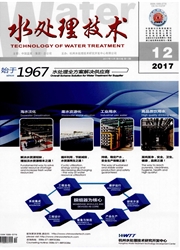

 中文摘要:
中文摘要:
采用电絮凝与浸没式超滤联用工艺处理集雨窖水,考察了影响氨氮和TP去除效果的主要因素,并与单独超滤进行比较。结果表明,电絮凝与超滤联用工艺对氨氮的去除主要以电吸附为主,兼有Cl^-间接电氧化的作用,而对TP的去除主要是电解产生的Al^3+与PO4^3-反应生成难溶的AlPO4。当在极板间距10min、电流密度18.51A/m^2、电絮凝时间15min的优化条件下时,对氨氮和TP的去除率分别为47%和90.1%,比单独超滤分别提高了36.9和80.7个百分点,电絮凝对超滤具有明显的强化作用。该联用工艺方便、高效,适用于农村分散式窖水的处理。
 英文摘要:
英文摘要:
This paper is based on the combination of electric flocculation and immersion ultrafiltration in processing of rainwater and cellar water which investigates the main factors which have affected ammonia nitrogen and TP removal efficiency, and also comparing with single ultrafiltration. The results indicate that the removal of ammonia nitrogen mainly lies in the combination of electric flocculation and ultrafiltration and have a function of Cl^- indirect electro-oxidation, for TP removal is mainly produced by the electrolysis of Al^3+ and PO4^3- reaction of refractory AlPO4. When the plate spacing is 10 mm, and the current density is 18.51 A/m^2, the electric flocculation time is 15 min, the removal rate of ammonia nitrogen and TP were 47% and 90.1 % respectively, when comparing to only use ultrafiltration, the removal rate increased by 36.9 and 80.7 percentage point, respectively, which indicates that the electric flocculation has obvious reinforcement on ultrafiltration. The combination process is convenient, efficient, and suitable for rural decentralized cellar water processing.
 同期刊论文项目
同期刊论文项目
 同项目期刊论文
同项目期刊论文
 期刊信息
期刊信息
